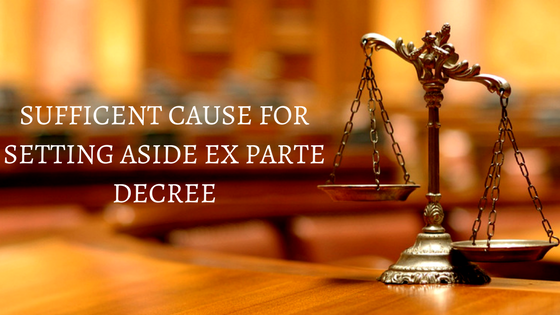Aapka Consultant Judgment Series- In this series, we are providing case analysis of Landmark Judgments of Hon’ble Supreme Court of India.
Arjun Singh v. Mohindra Kumar & Ors
AIR 1964 SC 993, 1964 SCR [5] 946
JUDGES: B.P. Sinha, A.K. Sarkar and N. RajagopalaAyyangar
Date of Decision: 13-12-1963
FACTS;-
This is an appeal with the special leave filed by the appellant-defendant. There were three suits out of which one was the main suit and others were the connecting cases. The two of which the appellant was defendant and in the other the plaintiff. These cases were consolidated and called for the joint hearing. On judgment day, the appellant was absent and ex-parte orders were passed against him. Thereby, he filed an application under Order IX Rule 7 but was rejected and affirmed by the High Court. Later, he applied to the trial court for taking evidence and proceeding with the case but the same was rejected. Thereafter, he filed again another application under Order IX Rule 13 for setting aside the ex parte order alleging the same facts and reasons as before. But by giving reason of res judicata both the trial court and the High Court dismissed the application. The same plea was raised before the Supreme Court under Article 136 for consideration of Order IX, R 7, 9 and 13 of the Code of Civil Procedure, 1908.
ISSUES;-
- When the principle of Res Judicata would apply?
- Is there any difference between a good cause and sufficient cause?
JUDGMENTS;-
While dealing with the facts of the case, the Supreme Court has observed a valuable point for consideration viz., the difference between the words “good cause” for non appearance in O. IX, R. 7 and “sufficient cause” for the same purpose in O. IX, R. 13 as therefore furnishing a ground for the inapplicability of the rule of res judicata. The scope of the principle of res judicata is not confined to what is contained in Section 11 of the Code but is of more general application is also not in dispute. Again, res judicata could be applicable to different stages of the same suit as to findings on issues in different suits.
There is no material difference between the facts to be established for satisfying the two tests of “good cause” under O IX R 3 for non appearance and “sufficient cause” under O IX R 13.
The inherent power of the Court cannot override the express or implied provisions of law. O IX R 7 and O IX R 13 provide for every contingency which is likely to happen in the trial vis-a-vis the non appearance of the defendant at the hearing of a suit. This being the position there is no scope or justification for the invocation of the inherent powers of the Court under Section 151.
The civil court had no jurisdiction in the present case to entertain the first application of the appellant under O IX, R 7 and hence the application under O IX R 13 was not only competent but had to be heard on merits without reference to the findings contained in the previous order.
In the result, the appeal is allowed and the application filed by the appellant under O IX, R 13 is remanded to the trial Judge for disposal.
HELD;-
Thus, ex parte order passed under O IX R 13 was held unenforceable.
To Get Legal Opinion from Advocates/ Legal Experts, Please click here
To Get Legal Opinion from Retired Hon’ble Judges, Please click here












